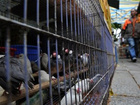Two new experimental treatments against advanced melanoma have shown promise in keeping the deadly skin cancer at bay, according to research presented in the United States on Monday.
The agents, known as Dabrafenib and Trametinib, are being developed by the British pharmaceutical firm GlaxoSmithKline, and were tested in clinical trials against standard chemotherapy treatments.
 Full Story
Full Story
A drug cocktail that combines chemotherapy with Avastin was shown to double the amount of time patients lived without progression of ovarian cancer, according to research released Saturday.
Also known as bevacizumab and marketed as Avastin by the Swiss pharmaceutical giant Roche, the drug could help women who have a resistant form of the cancer, researchers said.
 Full Story
Full Story
A drug that is already approved for prostate cancer has been shown to slow the spread of advanced forms of the disease for the first time, according to research released Saturday.
Zytiga, made by Johnson and Johnson, is being tested in a randomized phase III trial involving 1,088 men with prostate cancer at 151 cancer facilities in North America, Europe and Australia.
 Full Story
Full Story
Hong Kong health authorities on Saturday urged the public not to panic after the southern Chinese city reported its first human case of bird flu in 18 months in a two-year-old boy.
Authorities said the Chinese boy was in serious condition after testing positive for the deadly H5N1 strain of avian influenza and the city had raised the bird flu alert level to "serious" as well as increasing checks on live chickens imports.
 Full Story
Full Story
Fewer teenagers in the United States smoke and drink compared to their European counterparts, but more use drugs, according to a University of Michigan study released Friday.
Using data from 36 European countries plus the United States, researchers found that 27 percent of U.S. adolescents had consumed alcohol in the month prior to being quizzed by pollsters, compared to 57 percent of Europeans.
 Full Story
Full Story
A pair of experimental treatments that fight cancer by boosting the immune system have shown promise in early studies and deserve testing in larger patient groups, said U.S. research released Saturday.
The drugs, both made by Bristol-Myers Squibb, work by breaking down the shield that protects tumor cells. Rather than try to kill the cancer directly, they allow the immune system to do its work against the invading cells.
 Full Story
Full Story
European researchers said Thursday they have found a way to motivate paralyzed rats to learn to walk again through a combination of spinal cord stimulation and robotic-aided therapy.
The key to the method's success was how it engaged the rats to participate in their own rehabilitation, said Gregoire Courtine, lead author of the study published in the U.S. journal Science.
 Full Story
Full Story
Worldwide cases of cancer are likely to rise by nearly 75 percent by 2030, driven by demographic and lifestyle factors, according to a study published on Friday in the journal The Lancet Oncology.
A team led by Freddie Bray of the International Agency for Research on Cancer (IARC) in Lyon, France, said that in 2008 there were 12.7 million new cases of cancer, which would rise to 22.2 million by 2030, with 90 percent of the rise occurring in the poorest countries.
 Full Story
Full Story
New York's billionaire Mayor Michael Bloomberg extended his war against unhealthy habits Thursday with an unprecedented proposal for banning super-sized sweet drinks.
The ban, possibly taking effect by next March, would target what Bloomberg, already a leading crusader for clean living, calls a fatness "epidemic."
 Full Story
Full Story
Australian researchers have found that eating a block of dark chocolate daily over 10 years has "significant" benefits for high-risk cardiac patients and could prevent heart attacks and strokes.
A study of 2,013 Australians conducted at Melbourne's Monash University found that the consumption of 100 grams (3.5 ounces) of chocolate with a 70 percent or higher cocoa content every day was an effective measure to reduce risk.
 Full Story
Full Story



